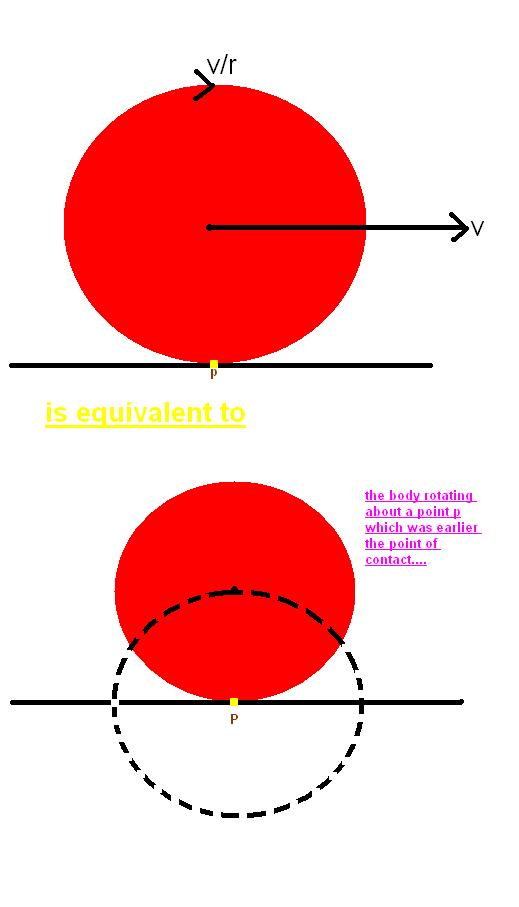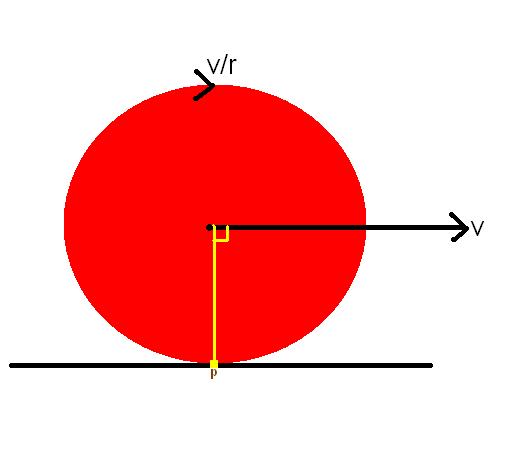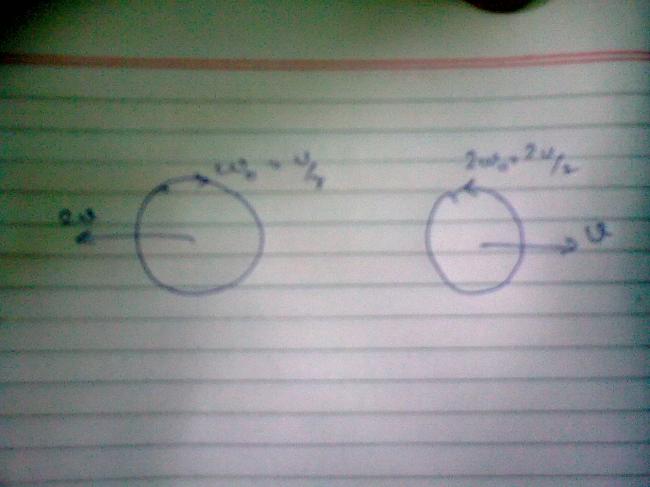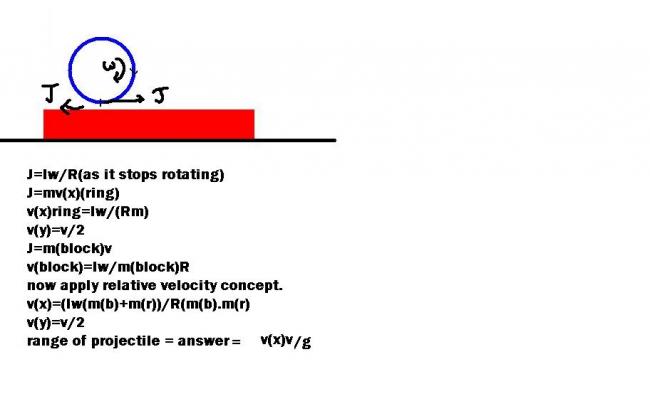i think u r rong in post #19
I C or Instantaneous Centre of Rotation
It is a simple theory to make problems of specific type easier.........if wisely used.....
It states When a body is moving on horizontal floor with pure rolling, then it is as good as the body rotating with the point of rotation as the centre of rotation.
The centre so considered is called instantaneous centre of rotation.

the theory states also to find out the respective instantaneous centres of rotation....
it says the instantaneous centre of rotation of any body lies on the perpendicular on the linear velocity vector of the body.
in the above figure, this can be shown thus......
the point p lies on the perpendicular to velocity vector.....
this thread continues...i hope so.....
-
UP 0 DOWN 0 8 53

53 Answers
as the sphere stops from rotating in infinitesimally small time interval, and the friction acting is impulsive, it must be max. For the worst case, i hav considered max friction....agar yeh galat lage toh apna soln. plzzzzzzz upload kaor.....
going offline now......tuitions dere........i'll try and post my solution later
plz refer to this guys.....that great....i'm at wits end.....
http://targetiit.com/iit-jee-forum/posts/centre-of-mass-12435.html

after collision the linear vel gets xchanged since they have same mass........
now let for the mass at left.....
let it attain vel v1 when pure rolling starts.........
conserving angular momentum,
2mvr-Iωo=mv1r+Iω1
putting ωo=v/r and ω1=v1/r
we get v1=8v/7.......ans
similarly it can be solved for the other mass.............
u wnat the disyance treavelled by the block b/w first and scond collision with the ring ????? then u shouls mention length of bolck
let us take it infinite length...n den find the max length travelled...otherwise is it okkies???????
@Querty......u can't directly find out accelerations using IAOR but still u can find it by applying this principle in other equations which had been derived earlier.........at IAOR linear v=0 ...it only has an angular velocity W0
no aveek i did not ask about direction, i asked magnitude of friction.......nw as u say i am confused whether my q was right or wrong......
n try #10......it was great solving it......spent whole night n got a clear conception about these type of problems.....neways try n i'll return in 10 mins....
what???????kuch samajh me nahi aaya????Nishant bhaiya...............
As far as i remember it came in AIEEE++ exam held on 14th Feb the test series conducted by FIITJEE for AIEEE for class 12...
solution to #10:
drawing FBD of loop and equating forces
F-f-T=ma
f.R+T.r=Iα=IRa (for pure rolling)
N=mg
again
T-f'=Ma
N=Mg
and in the limiting case(when the block starts moving)
f'=kMg!
now we have to find I for the loop
that will be done using integration
considering a loop of width dx at a dist x frm centre
dI=mπ(R2-r2)2πx(dx)(x2)
gives I=\frac{2m}{R^2-r^2}\int_{r}^{R}{x^3dx}=\frac{m(R^4-r^4)}{2(R62-r^2))}=\frac{1}{2}m(R^2+r^2)
thus using that we can solve the eqns and problem
just pointt out if u find any mistakes! :)
# 11 is easy
write torque abt c =Ic(alpha)
then, the point P of the rod attached to the string has zero acceleration along the string
i.e (component of ac Along the string ) + (component of ap/c Along the string )= 0
#19
but i thought differently........
e=vel of recoil/vel of approach.
thus in vertical direction,
vel after collision v1=v/2
This is wrong.
Where is w- angular velocity in your expression?
You have to consider wR for writing Law of restitution.
bhaiya mere woh sahi hai n my answer is also correct i think!consider direction of the two things u r talking exactly perpendicular so u see no fusses about the law of restitution[1]
not yet solved......arre yaar india mei kya koi bhi late jagne wala aur jaldi uthne wala nehi hai??????? anyways, i will upload the solutions tonight
let me prove something mathematically.....wether the purely rolling body n the body with circular motion has equal energy.....
total energy=1/2mv2+1/2Iω2=1/2mv2+1/2Iv2/r2=1/2v2(m+I/r2)
=1/2(v2/r2)(mr2+I)
=1/2ω2(I+mr2)
by parallel axis theorem Io=moment of inertia about p= I+mr2
so total energy=1/2ω2(I+mr2)=1/2Ioω2
=energy of body rotating about axis through p with same angular velocity ω....
hence proved.......
